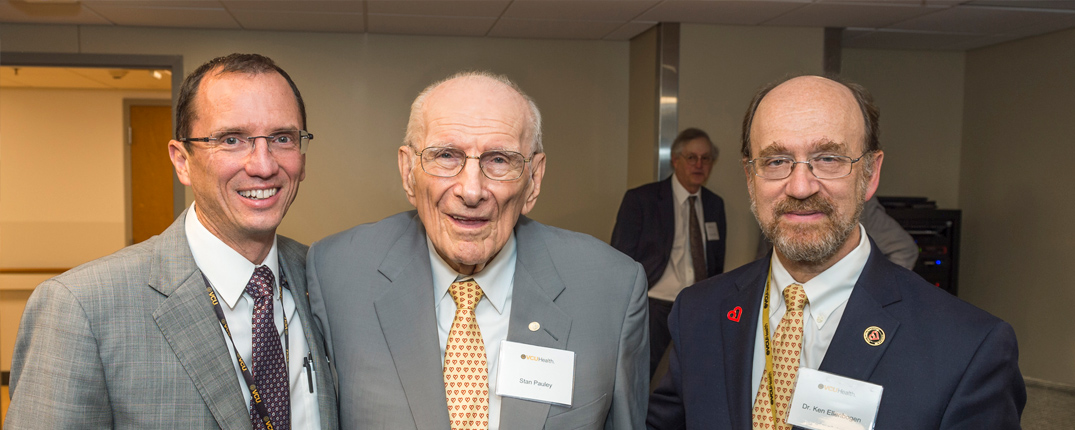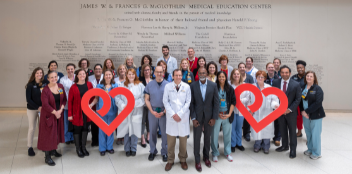Mapping the future for cardiac arrhythmia
Pauley family’s $5 million gift will support research and clinical care.

A generous donation from the Pauley Family Foundation will help the VCU Health Pauley Heart Center address urgent, unmet needs in the management of cardiac arrhythmia.
The $5 million gift, announced in November, will support the next evolution of the most comprehensive treatments for patients with harmful irregular heart rhythms.
“The gift will fund the equipment necessary to diagnose and treat arrhythmia disorders, one of the major adverse consequences of cardiovascular disease,” said Dr. Greg Hundley, director of the center.
“It pleases me to support the center’s research and innovation in the area of cardiac arrhythmia, whereby their discoveries will continue to improve lives in our community,” said Stanley Pauley, a former heart center patient who oversees the Pauley Family Foundation, along with his wife, Dorothy, and daughters, Katharine Pauley Hickok and Lorna Pauley Jordan. In 2006, the foundation gave its first $5 million gift to the heart center, which was later renamed the Pauley Heart Center.
Under the direction of Dr. Kenneth A. Ellenbogen, VCU Health has gained international recognition in the management of heart disease related to harmful heart rhythms. Those that are irregular, too slow or too fast can increase mortality, reduce quality of life and limit one’s ability to perform activities of daily living.
As the population ages, atrial fibrillation, an irregular and often rapid heart rate, is increasingly common. Ventricular dysrhythmia, a disturbance in the electrical activity of the heart’s lower chambers, is an additional health care concern for those with existing heart disease.
Specifically, the funds will help expand imaging into the field of electrophysiology
The $5 million gift will be used to help VCU Health researchers and clinicians perfect their diagnoses, and develop and deliver innovative therapies to cure adverse heart rhythms in an effective, cost-efficient manner. Specifically, the funds will help expand imaging into the field of electrophysiology, Hundley said. The new imaging devices will allow physicians to see precisely where — and, most importantly, why — the electrical issues in the heart are originating, so that they can be most accurately ablated or defibrillated.
Plans include acquiring state-of-the-art clinical and noninvasive blood pressure monitoring equipment with advanced technology that will enable Ellenbogen and his team to tackle a range of cardiac procedures. The gift will also permit the purchase of four handheld echo machines that will help clinicians make bedside diagnoses.
Additionally, the gift will allow the center to build out a research operating room in the Cottrell Surgical Innovation Suite and outfit the Pauley Heart Center Imaging Clinic with an advanced 1.5 Tesla MRI scanner and state-of-the-art CT scanner, expanding non-ionizing radiation (or X-ray) imaging capabilities. The ability to provide cardiac imaging to patients with implanted devices will allow VCU Health to more efficiently and effectively diagnose and treat diseases like atherosclerosis, cardiomyopathy, heart failure, aorta aneurysm, heart valve disease and cardiac tumors.
Previous gifts from the Pauley Family Foundation are helping VCU Health stay at the forefront of cardiac care nationally. The recent purchase of a 3T MRI scanner brought the latest technology to VCU Medical Center and filled a critical need in cardiac imaging regarding management of patients with coronary heart disease and heart failure. From this investment, Pauley has increased the number of cardiac MRIs by 95% in the first year and prevented at least 87 heart attacks. Additionally, five researchers were recruited to develop and test innovations toward management of patients with coronary heart disease and heart failure.
Back to Spring-2020
Join our Pauley Consortium composed of patients, friends and advocates.

